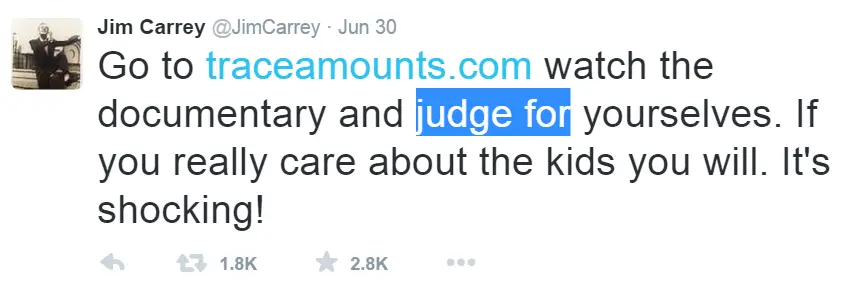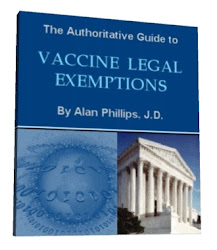Jim Carrey’s Controversial Vaccine Tweets Backed by Undeniable Evidence
By Yelena Sukhoterina, AltHealth Works
Actor and comedian Jim Carrey made quite a splash over the last few days when he turned to Twitter to share his opinions on vaccinations after California’s Governor Jerry Brown signed the new S277 bill.
The legislation made it mandatory in California to vaccinate schoolchildren, and eliminated the exemptions for personal or religious beliefs. Carrey posted numerous times that he is not “anti-vaccine” but is rather “anti-neurotoxin” and “anti-mercury.”
Carrey recently offered up the following controversial Tweet.
[do_widget id=text-16]
Many mainstream news outlets covered the story by telling Carrey to “shut up,” labeling him as an “anti-vaxxer” and stating that someone who is an actor cannot know science.
Yet there are a lot of doctors, especially naturopaths of many different disciplines, who share his concerns about vaccines. So let’s take an in-depth look at what his tweets were really talking about, and the abundance of evidence from the CDC and other sources backing them up.
Robert Kennedy Jr. is an attorney and author whose main subjects of interests are protecting the environment. He recently posted this graphic on his Facebook, an unedited version of an article he wrote about the book Thimerosal: Let The Science Speak and the movie Trace Amounts.
He writes that he is pro-vaccine, as he believes they save lives; but he is against unnecessary and “dangerous” usage of thimerosal in vaccines and what he says is an unnecessary number of vaccines.
He states that while CDC recommended five childhood vaccines in 1954, today children receive “56 doses of 14 vaccines” before they turn 18. He states that in his opinion and research the only reason for that is for the pharmaceutical companies to make money.
According to Centers for Disease Control and Prevention (CDC), thimerosal has been used as a preservative in vaccines since 1930s, and it does contain mercury. Many vaccines became thimerosal-free in 1999 as a “precautionary measure,” but it is still used in one-third of all flu vaccines and two childhood vaccines — one DTaP and one DTaP-Hib.
The CDC states that those vaccines do have “trace amounts of thimerosal.”

Trace Amounts is a 2015 documentary by directors Eric Gladen and Shiloh Levine about the possible connection between autism, mercury and vaccines. After Gladen became sick at the age of 28 after receiving a vaccination, he traveled the country attempting to find out if what happened to him might be similar to the kids who have bad reactions to the vaccines.
Gladen eventually joined the discussion about whether or not the vaccines themselves are the problem, or if the problem is their additives – specifically thimerosal — and whether they can be linked to autism.
One of the reasons for this questioning is the growing number of kids with autism. Those born in 1992 had a 1-in-150 chance of developing autism, those born in 2002 1-in-68 according to CDC statistics.
In the movie the directors interview scientists and physicians, parents of ill kids, investigative reporters, a former NBC News medical director and a retired congressman to help them look for answers.
Another movie that came out this year is Bought by Jeff Hays, and it explores possible effects vaccines, GMOs and medications have on health. One of the stories it follows is of Porter, the autistic son of Sarah Bridges from Minneapolis, MN. The mother and son pair’s lives were forever altered after he turned four months old, the same time he received a row of vaccines.
Bridges filed a suit in 1994 through the National Vaccine Injury Compensation Program (established in 1986 by Congress), reported by Minnesota Monthly and in 2011 she won the case and subsequent settlement with the government worth about seven million dollars.
 The settlement stated that a combination of childhood vaccines caused Porter to have encephalopathy – brain damage.
The settlement stated that a combination of childhood vaccines caused Porter to have encephalopathy – brain damage.
Bad Reactions to Vaccines are a Fact of Life
Vaccines can cause bad reactions, sometimes life-threatening. As the CDC states, “like any medication, vaccines can cause side effects.”
Different vaccines have different side effects. The side effects range from mild – such as headache, fever, and nausea; to severe – allergic reactions, seizures, and severe pain. Rare but possible severe reactions include life-threatening severe illness and permanent brain damage.
Under “Vaccine Safety” page, CDC’s website states that Vaccine Adverse Event Reporting System (VAERS) was put into place in 1990 for anyone to be able to report bad reactions to vaccines. Anyone can view this data since the site’s creation.
CDC states that “approximately 30,000 VAERS reports are filed annually, with 10-15% classified as serious (resulting in permanent disability, hospitalization, life-threatening illnesses or death).” By this statistic, 3,000 to 4,500 people every year become disabled for life or die as the result of a reaction to a vaccine.
While CDC’s studies show that the percentage of bad reactions is small, knowing that there is risk involved, some parents do not want to take any risk that can compromise their child’s health for the rest of their life or even kill them, and they demand to have the right to opt out from vaccinations, while others demand safer vaccines.
The Case Against Mandatory Vaccines
A Petition to prohibit mandatory vaccination laws collected 131,513 signatures this past February. The petition states: “No human being should be FORCED to be vaccinated against their will and/or personal/religious beliefs.”
The filmmakers of Trace Amounts also state that they “respect people’s decision to choose whether or not to vaccinate themselves or their dependents.”
For many, that is the biggest argument.
Whether it is mercury or something else that causes life threatening reaction to vaccines, some parents do not want to take any risk when it comes to the life and well-being of their children.
Some will also argue that making any health decision mandatory goes against the American Medical Association’s Code of Medical Ethics:
Opinion 8.08 – Informed Consent
“The patient’s right of self-decision can be effectively exercised only if the patient possesses enough information to enable an informed choice. The patient should make his or her own determination about treatment.”
Opinion 10.02 – Patient Responsibilities (see link here)
“Like patients’ rights, patients’ responsibilities are derived from the principle of autonomy. The principle of patient autonomy holds that an individual’s physical, emotional, and psychological integrity should be respected and upheld. This principle also recognizes the human capacity to self-govern and choose a course of action from among different alternative options. Autonomous, competent patients assert some control over the decisions which direct their health care. With that exercise of self-governance and free choice comes a number of responsibilities.”
This article first appeared at AltHealth Works – Like at Facebook






